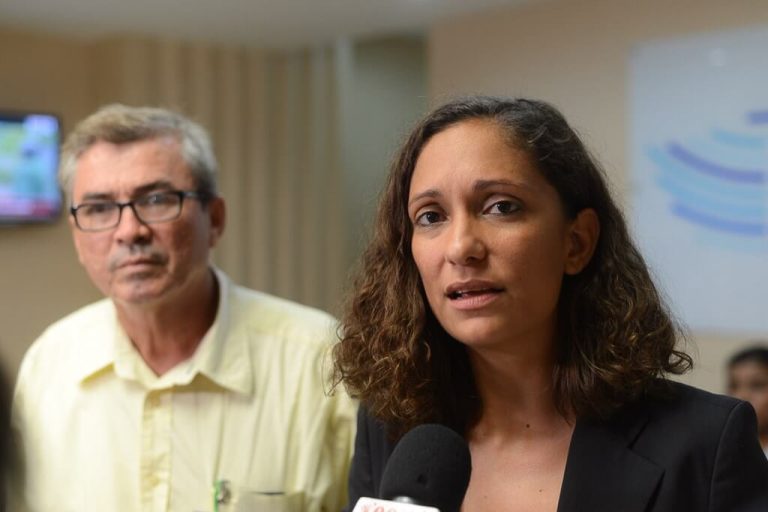13 de abril 2016

Children of Exile: The Births “Sowing Hope” in the Camp of Nicaraguan Farmers

PUBLICIDAD 1M
PUBLICIDAD 4D
PUBLICIDAD 5D
Alba Palacios argues that the Supreme Court hasn’t allowed appeals based on the Canal’s unconstitutionality

Attorney Monica Lopez Baltodano answers questions on the National Assembly’s rejection of the rural citizens’ initiative against the canal. Photo: Carlos Herrera/Confidencial
The secretary’s office of the National Assembly has rejected the citizens’ initiative to repeal Law #840, which ratifies the Canal concession and the related land expropriations. It declared itself “legally incapable” of processing the request presented on Thursday April 7 by the rural movement known as the National Council for the Defense of our Land, Lake and National Sovereignty.
The central argument of the Parliamentary Secretary in rejecting the proposal backed by 28 thousand signatures is that the Supreme Court disallowed the appeals of unconstitutionality against Law 840 presented in 2013 by diverse civic and political organizations and individual citizens.
The rejection – signed by the first secretary of the Legislative branch, Sandinista deputy Alba Palacios – puts forth the argument that sentence number 30 of the Judicial Branch “produces an erga omnes [towards all] effect, in the sense that something was processed and judged in a general form involving the issue of constitutionality or unconstitutionality.” “As a result, the National Assembly can’t process this initiative since the result would be (…) that a firm sentence dictated by the Supreme Court of Justice, within the area of their competence, was left without effect.”
The Secretary’s argument also invokes article 49, number 8 of the Constitutional Law of Parliament, modified in 2015, that establishes the “lack of competence” to process the initiative presented by the rural movement.
Article 49 states that “it’s among the functions of the First Secretary (…) to reject the initiatives and requests whose content or processing would be notoriously inadmissible due to their being outside the competence of the National Assembly. The promoter of the initiative or request can appeal in writing to the Board of Directors within three days, and the latter will resolve the matter without further recourse.
Surprising notification
Mónica López Baltodano, environmental lawyer and legal advisor to the farmers, stated that the notification received from the Parliamentary Secretary on Monday afternoon took them by surprise. Any modification or refusal of a citizens’ initiative is supposed to be communicated within 24 hours of its presentation. In this case, the notification should have arrived on Friday, April 8.
López Baltodano did not accept the rejection letter signed by Palacios, since it was dated Friday, April 8, and she insisted that they were notified this Monday, April 11. The legal representative termed the action “untimely”.
“We demanded that the first Secretary sign a letter with today’s date, and the hour in which we were being notified. Since they rejected that request, we said that we would not accept something with the incorrect date, in accordance with the law,” Baltodano stated upon leaving Parliament.
For the lawyer, the Secretary’s office of the Legislative Branch is being used to express a deliberate intention: “to tell the country that the Canal law has been written in stone, and that not even 28 thousand citizen signatures can modify it. It’s an aberration from the legal point of view, an egregious situation, and we’re going to go forward with the corresponding social mobilizations,” López Baltodano declared.
Refutes the Secretary’s argument
The lawyer said that they wouldn’t recognize the Secretary’s rejection. They consider it “shameful” that Parliament should allege that they can’t reform a law that they themselves approved thanks to a Sandinista majority. “It’s absurd to allege that a ruling of the Supreme Court exists, because that signifies that no law could be reformed if its constitutionality has been declared,” protested López Baltodano.
According to her, it’s a function of the National Assembly to process legal citizen initiatives. “Once again, it’s been made clear that there’s a political decision to push through this canal concession, even if it mean bulldozing past the citizenry,” she stated.
Latin American Water Tribunal issues a condemnation
Meanwhile, the Latin America Water Tribunal emitted a verdict on April 8 in which it “condemns” the Nicaraguan State for awarding the Canal concession to the Chinese businessman Wang Jing, and for “conceding privileges to the franchisee in detriment of the rights and interests of all Nicaraguans and the inapplicability of the regulations renouncing their national sovereignty.”
The Water Tribunal, in sessions held in El Salvador, recommended that the government of Daniel Ortega apply a “general moratorium” on the construction of the canal project and all related activities.
“In any case, before initiating the Canal construction process referred to here a scientific and independent environmental, social and economic evaluation should be realized,” the ruling stated.
---
This article has been translated by Havana Times.
Archivado como:
PUBLICIDAD 3M
Periodista. Destaca en cobertura a violaciones de derechos humanos: desplazamiento forzado, tráfico ilegal en territorios indígenas, medio ambiente, conflictos mineros y ejecuciones extrajudiciales. Premio Iberoamericano Rey de España 2018.
PUBLICIDAD 3D